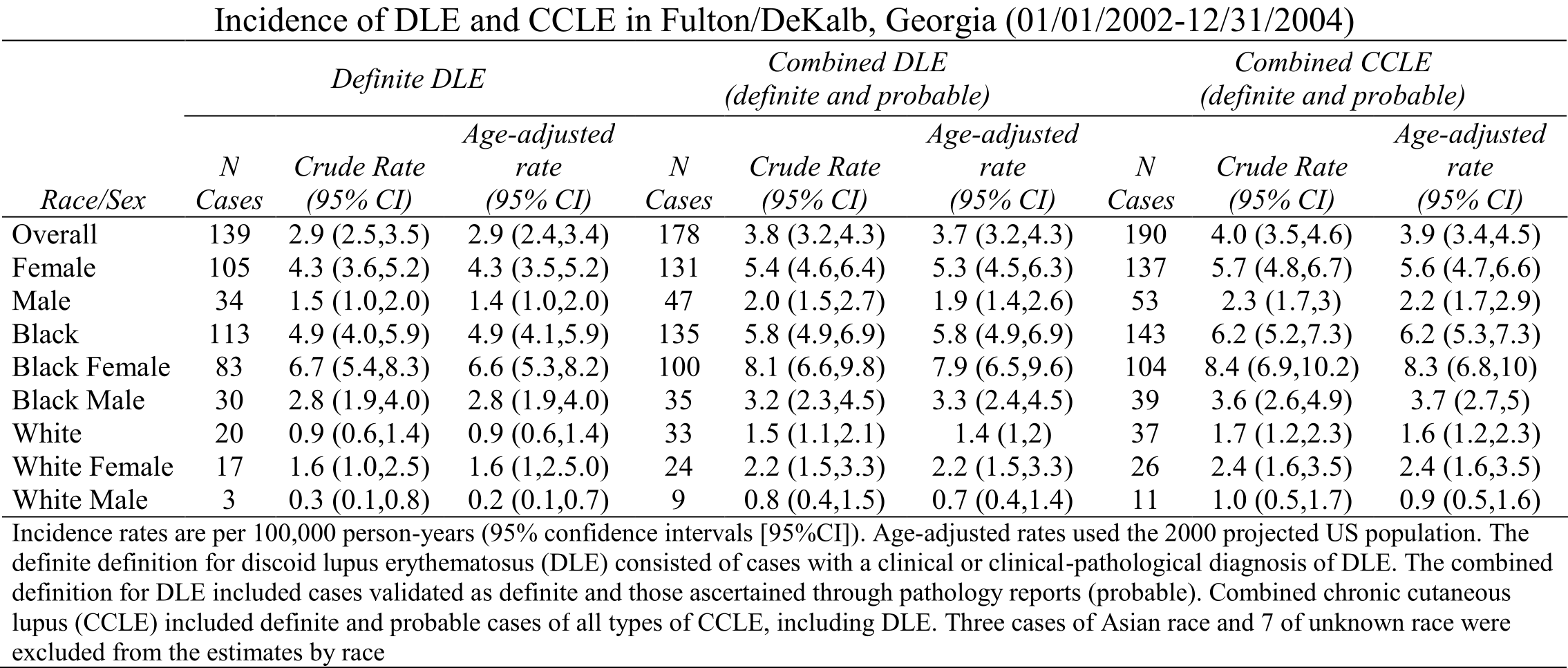Session Information
Session Type: ACR Poster Session B
Session Time: 9:00AM-11:00AM
Background/Purpose: Chronic cutaneous lupus erythematosus CCLE is a group of immune mediated inflammatory disorders of the skin that often induce permanent disfigurement, leading to a substantial negative impact on patientsÕ quality of life. CCLE comprises discoid lupus erythematosus (DLE), lupus erythematosus profundus or lupus panniculitis (LEP), lupus erythematous tumidus (LET) and chilblain lupus erythematosus (CHLE). Relative to SLE, epidemiologic studies on CCLE are rare and limited to populations without racial diversity. This study provides minimum estimates of the incidence of DLE in particular, and CCLE in general, in a predominantly white and black population in the Southeastern United States.
Methods: The Georgia Lupus Registry is a Centers for Disease Control and Prevention-funded registry conducted to estimate the burden of lupus in a large diverse population of the Southeastern United States. Multiple sources, including dermatology and rheumatology practices, multispecialty healthcare facilities, and dermatopathology reports were used to ascertain potential new cases of CCLE from 2002 through 2004. Cases with a clinical or clinical-histological diagnosis of DLE were classified as definite DLE. Cases ascertained exclusively from dermatopathology reports were categorized as probable DLE. Age-standardized rates were determined and stratified by race and sex for DLE in particular and CCLE in general.
Results: The overall age-adjusted incidence of definite and combined (definite and probable) DLE were 2.9 and 3.7/100,000 person-years, respectively. Overall age-adjusted estimate for combined CCLE was 3.9/100,000 person-years. Black-to-white and female-to-male incidence ratios were 5.4 and 3.1 for definite DLE.
Conclusion: Our findings underscore striking racial disparities in the susceptibility for CCLE, with black people experiencing between three and five-fold increased incidence of CCLE in general and DLE in particular, compared to white people. Gender differences were consistent with those reported previously, with a 3 times higher risk of DLE in females compared to males.
To cite this abstract in AMA style:
Drenkard C, Parker S, Gordon C, Hemlick C, Aspey L, Bao G, Lim SS. Incidence of Primary Chronic Cutaneous Lupus Erythematosus in a Metropolitan Area of the Southeastern United States: The Georgia Lupus Registry [abstract]. Arthritis Rheumatol. 2016; 68 (suppl 10). https://acrabstracts.org/abstract/incidence-of-primary-chronic-cutaneous-lupus-erythematosus-in-a-metropolitan-area-of-the-southeastern-united-states-the-georgia-lupus-registry/. Accessed .« Back to 2016 ACR/ARHP Annual Meeting
ACR Meeting Abstracts - https://acrabstracts.org/abstract/incidence-of-primary-chronic-cutaneous-lupus-erythematosus-in-a-metropolitan-area-of-the-southeastern-united-states-the-georgia-lupus-registry/

